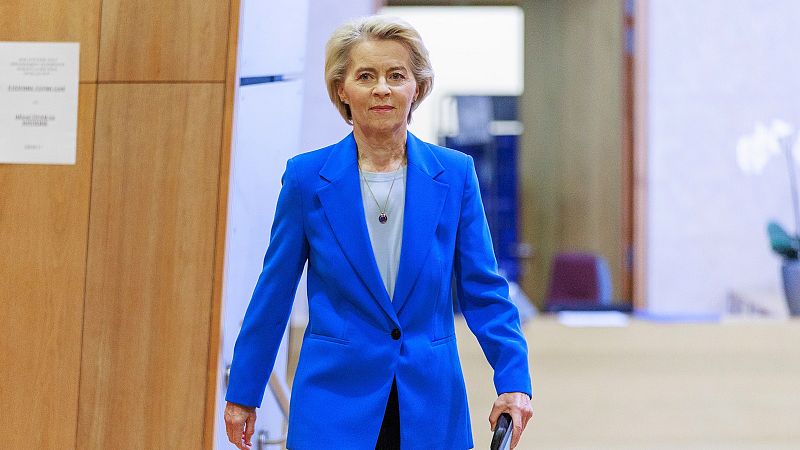
Ursula von der Leyen has endorsed a new bill rapidly making its way through the US Senate that would impose sweeping sanctions against Russia in a bid to force the Kremlin into serious negotiations for a lasting peace in Ukraine, despite the law having the potential to wreak economic havoc on several countries of the European Union.
The bill, jointly promoted by Lindsey Graham, a Republican from South Carolina, and Richard Blumenthal, a Democrat from Connecticut, has amassed more than 80 signatures in the 100-seat chamber, an impressive amount of bipartisan support that could help convince President Donald Trump to move forward with the plan.
Trump has so far refused to apply further pressure on Moscow, causing dismay among European allies, who have pledged to move forward with restrictions on their own.
After a "good" meeting with Senator Graham on Monday, von der Leyen suggested the draft law work in tandem with the next package of EU sanctions, meant to target Russia's financial sector, the "shadow fleet" and the Nord Stream pipelines.
Brussels also wants to lower the G7 price cap on Russian seaborne oil, which has remained untouched at $60 per barrel since its introduction in late 2022.
The president of the European Commission "made the objective clear: we need a real ceasefire, we need Russia at the negotiating table, and we need to end this war. Pressure works, as the Kremlin understands nothing else," her office said.
"This is why the President welcomed that Senator Graham committed to ramping up pressure on Russia and moving ahead with the bill in (the) Senate next week."
Under the draft law promoted by Graham and Blumenthal, the US would slap a wide range of primary sanctions and duties on Russia, such as broad prohibitions on financial transactions with entities owned or affiliated with the Kremlin.
Most notably, it would also introduce secondary tariffs of "not less" than 500% on any country that "knowingly sells, supplies, transfers, or purchases oil, uranium, natural gas, petroleum products, or petrochemical products that originated in the Russian Federation".
Russia's clients under fire
In theory, this provision would hit hard several member states that continue to rely on Moscow for their energy needs.
As of today, France, Spain, Belgium, the Netherlands and Portugal buy Russian liquefied natural gas (LNG); Italy, Greece, Hungary, Slovakia and Bulgaria buy Russian pipeline gas; and Hungary and Slovakia buy Russian pipeline oil.
Additionally, five countries – Bulgaria, the Czech Republic, Hungary, Slovakia and Finland – operate Russian-made nuclear reactors that rely on specific Russian-made fuels.
The bill, however, features a clause that would allow the US president to spare specific countries, goods and services from the 500% tariff through a one-time waiver – as long as doing so is justified for "national security interests".
It was not immediately clear if von der Leyen discussed this exemption during her meeting with Graham. Her positive words following the encounter suggest the Commission chief is confident the bloc will manage to avoid the blowback.
Both Graham and Blumenthal have pointed the finger at China and India as the prime clients of Russian energy and, therefore, the prime targets of the 500% tariffs.
After a joint trip to Kyiv and Paris, the senators hailed new momentum to advance their bill, warning the window to prevent a renewed Russian offensive was closing fast.
"The world has a lot of cards to play against Putin," Graham told the Associated Press. "We're going to hit China and India for propping up his war machine."
Graham called the draft "the most draconian bill I've ever seen in my life in the Senate", while Blumenthal said the proposed sanctions would be "bone-crushing" and place Russia's economy "on a trade island".
Officials in Brussels believe the combination of 500% tariffs with a lower price cap would have a devastating impact on Moscow, as global clients would rush to flee Russian energy and precipitate a plunge in revenue for the federal budget.
Still, the White House has made no indication it is willing to amend the G7 price cap.
"These steps, taken together with US measures, would sharply increase the joint impact of our sanctions," von der Leyen said, according to the read-out. "Combined with actions targeting Russia's shadow fleet limiting Russia's ability to transport its oil, it's an effective measure to dry up the Kremlin's resources to wage the war."
The meeting between von der Leyen and Graham comes as delegations from Ukraine and Russia meet in Istanbul for a new round of face-to-face negotiations.







